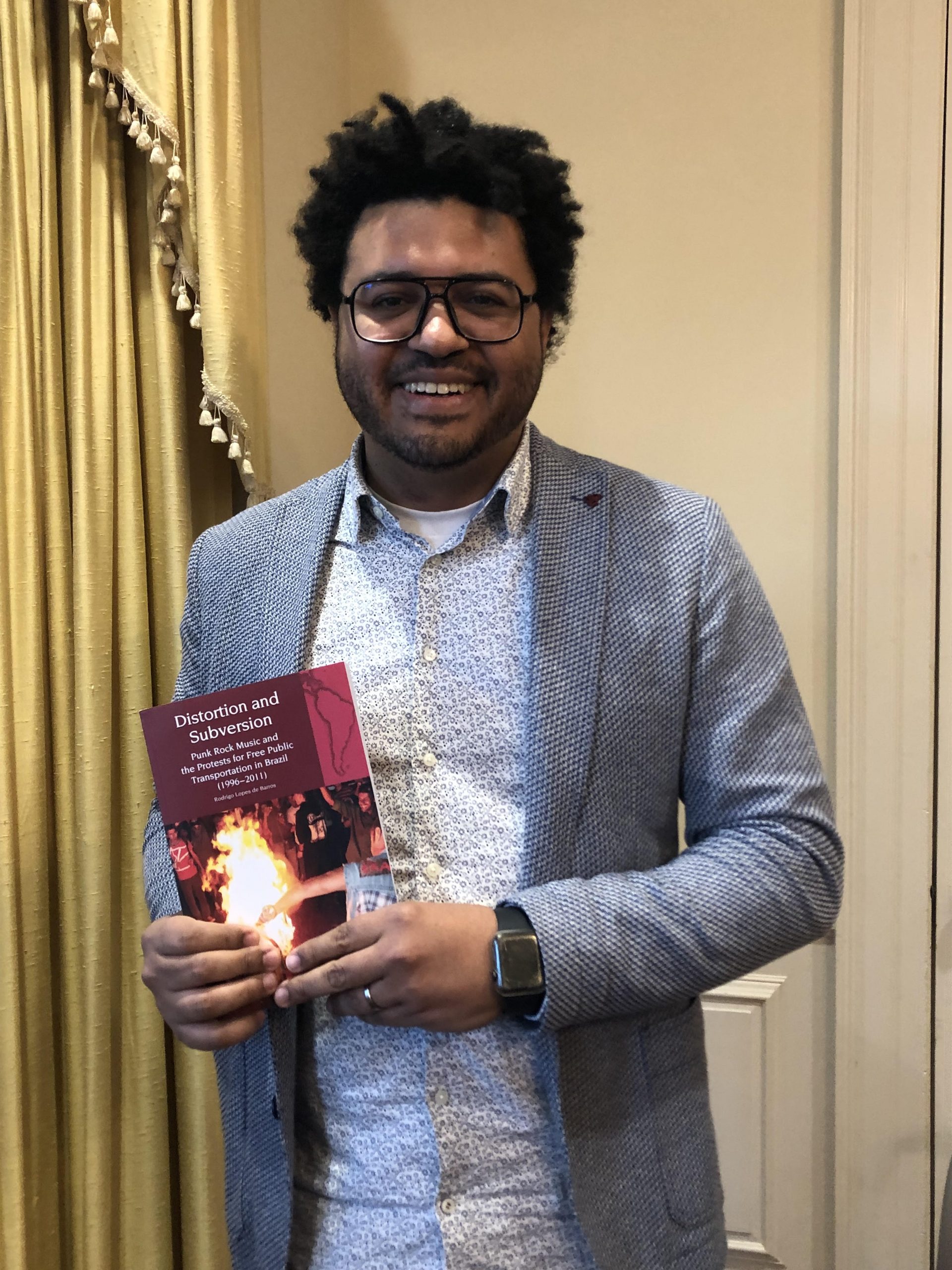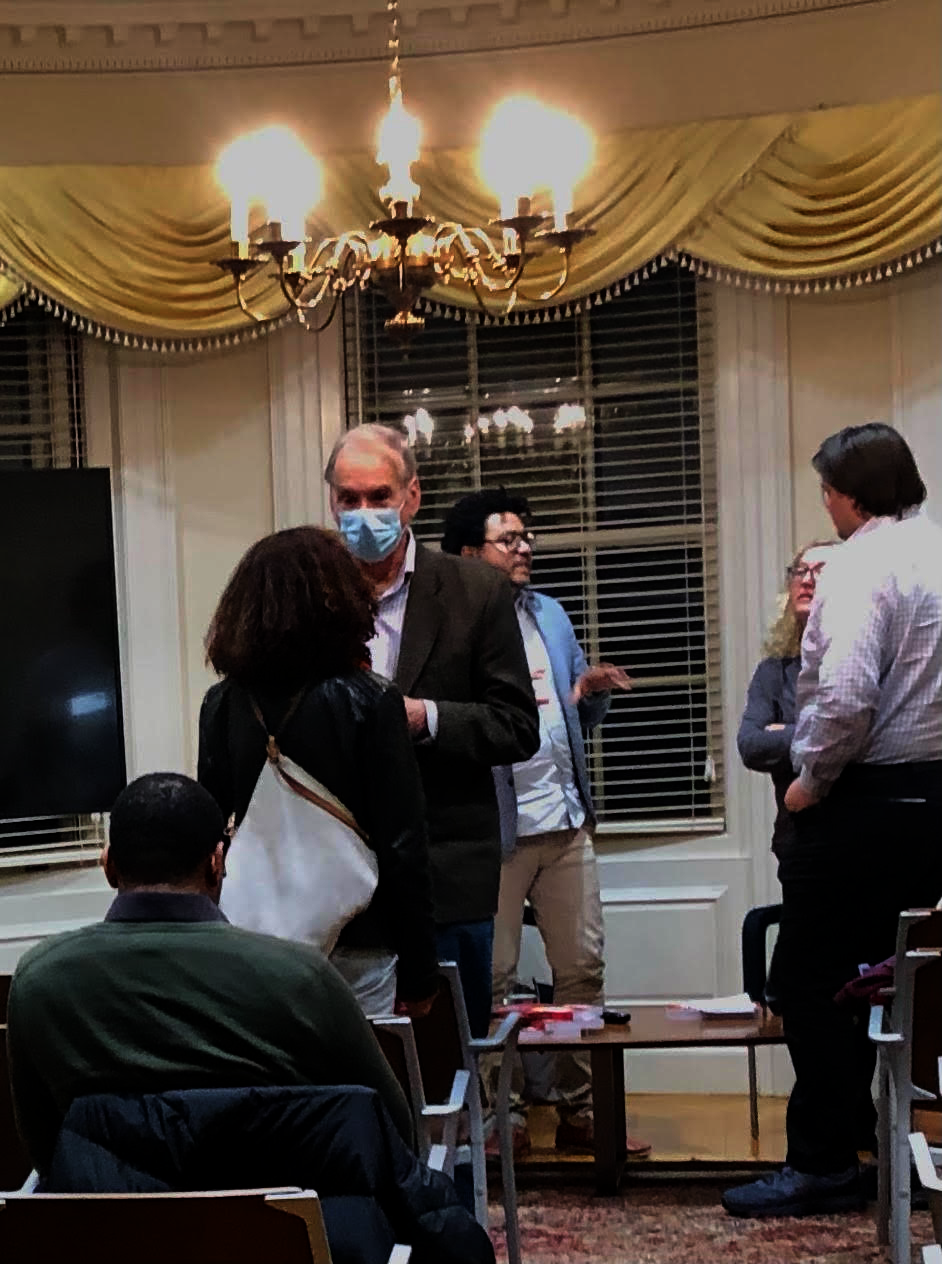Distortion and Subversion: Punk Rock Music and the Protests for Free Public Transportation in Brazil (1996-2011)

No one expects to hear punk rock blasting from an academic building on quiet Bay State Road. However, this sound was not so unusual within the context of the event that took place at the Initiative on Cities on November 14, 2022: a launch celebration for Assistant Professor Rodrigo Lopes de Barros’s (Romance Studies, LAS, CIMS) new book Distortion and Subversion: Punk Rock Music and the Protests for Free Public Transportation in Brazil (1996-2011) (Liverpool University Press), which explores how punk rockers contributed to the movement for free public transit in Brazil.
The BU Initiative on Cities (IOC) invited Lopes de Barros to present his work as part of its Urban Seminar Series. Attendees ranged from undergraduates intrigued by the presence of punk rock in an academic presentation to faculty members from across departments. In his talk, Lopes de Barros transported all attendees to a late twentieth-century Brazil experiencing rising frustrations over fare hikes, growing access to the internet, and an evolving punk scene
Distortion and Subversion is a project that Lopes de Barros began at Boston University. “I wanted to tell the story of my generation through the internet,” said Lopes de Barros, a Brazilian native. To accomplish this, Lopes de Barros engaged in what he refers to as “cyber archaeology.” He downloaded over 150,000 files from the Internet Archive to collect news articles from now-defunct websites of organizations such as Independent Media Center, an activist publishing network focused on social justice that emerged in the late nineties. In addition to this cyber archaeology, he also conducted interviews with a variety of musicians and activists.
While Lopes de Barros initially planned to focus solely on the famous 2013 Brazilian protests organized by the Movimento Passe Livre (Free Fare Movement), he soon found that the complex interaction between the movement and the punk scene went back decades. Lopes de Barros traces this interaction across time and across Brazil, focusing on events from four major cities: Salvador, Belo Horizonte, Florianópolis, and São Paulo. Lopes de Barros highlights songs from the evolving Brazilian punk scene that advocate for access to public transit and the city as an openly accessible space for youth. As the anarchist band Lumpen puts it, “Lumpen is the bro from the outskirts who has to ride a bus.”
Placing lyrics from punk songs on the screen in both Portuguese and English, Lopes de Barros pointed out direct references to the movement for free public transit as a part of punk’s general message of opposition to capitalist systems. “Free transport activists sought to break any existing limitations on the rights of the people,” said Lopes de Barros—a project not that different from that of the punk movement. Free fare activists provided bands with large venues, and bands provided the movement with an eager young base. Some activists were even members or former members of the bands themselves; Free Fare Movement activist Leo Vinicius was a member of the 1990s rock band Guerra de Clases, for example.
Activists for free fare saw punk music as a way to mobilize youth to protest, which they accomplished. Young people turned out for the Revolution Carnivals in Belo Horizonte in the 2000s to discuss vegetarianism, listen to punk music, and protest for free fare for students as part of universal public education. This generation also participated in the 2003 Revolta do Buzu (Bus Revolt) in Salvador and the 2004-2005 turnstile revolts in Florianópolis. The cover of Distortion and Subversion depicts a scene common during these revolts, the burning of a bus turnstile, a symbolic destruction of state-imposed obstacles. Especially powerful was a quote from activist Flora Lorena Müller: “The struggle against turnstiles is the struggle for the right to the city.” Protestors convinced many officials to postpone or freeze local fare hikes.

While free transit has yet to become a reality in Brazil, through their “struggle for the right to the city,” punk rockers and political activists “reconceptualized notions of urban space in Brazil.” Lopes de Barros’s book provides important context for the biggest Brazilian protests in decades, and a publication subvention from the Center has fittingly made this book about the right to access resources freely available via Open Access Publishing in European Networks.